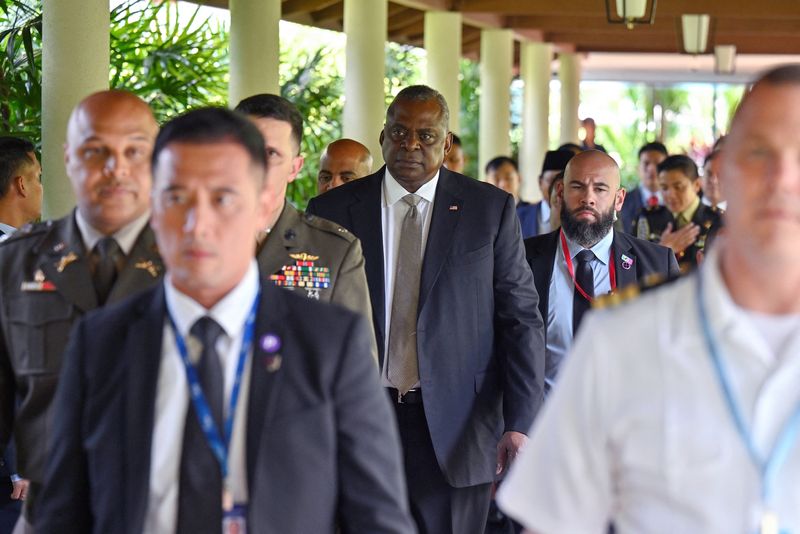Global Courant
By Idrees Ali, Phil Stewart and Yew Lun Tian
WASHINGTON/BEIJING (Reuters) – Brief smiles and handshakes by US and Chinese military leaders at a luxury hotel in Singapore on Friday belied a deep freeze in communications between the two armed forces that is becoming a growing concern at the Pentagon.
US Secretary of Defense Lloyd Austin had sought a proper meeting with his Chinese counterpart at the annual Shangri-la dialogue, but Beijing declined. Instead, the retired US Army general had to settle for a quick exchange over dinner ahead of a weekend of meetings between Asian military leaders.
The awkward meeting is just the latest example of what US officials and analysts say is a troubling disparity between how the two countries view military risks, with the United States pushing for more and deeper military communications and China reluctant to participate.
Relations between the superpowers are becoming increasingly bitter, with friction over issues ranging from Taiwan and China’s military activities in the South China Sea to US efforts to hold back China’s semiconductor industry.
The US military has responded by pushing for open lines of communication with their Chinese counterparts – both at senior and working levels – to reduce the risk of potential flare-ups, something it has long advocated for.
China’s leaders, on the other hand, have been slow to establish military contacts, quickly shedding them during periods of diplomatic tension. After the US shot down an alleged Chinese spy balloon earlier this year, phone lines went down and have remained that way, US officials say.
This has frustrated the United States.
“We’ve had a lot of trouble proposing calls, proposed meetings and dialogues,” said Ely Ratner, U.S. Deputy Secretary of Defense for the Indo-Pacific, speaking at an event last week.
“We … have had an outstretched hand on this issue of military-to-military engagement and we have yet to have a consistently willing partner.”
Story continues
RISKS AND BENEFITS
China had an obvious reason to push back a meeting between Austin and China’s National Defense Minister Li Shangfu: Li has been under US sanctions since 2018 for purchasing fighter jets and equipment from Russia’s top arms exporter .
Zhu Feng, dean of the School of International Studies at Nanjing University, said Beijing believed the sanctions against Li showed the United States was not sincere in its efforts to talk to China.
“The main reason why China is hesitant to let its defense minister meet the US is because we think the dialogue should be on an equal footing,” Zhu said.
But other factors lie behind this, analysts say, including a different assessment of the risks and benefits and differing negotiating approaches.
While neither country wants a casual military clash, China believes the US military is operating in its sphere of influence, including in the South China Sea and around Taiwan.
As a result, China’s leaders don’t believe it’s in their best interests to use military talks to ease American fears, said Jacob Stokes, a senior fellow at the Center for a New American Security.
“China wants the United States and its partners to be concerned about mounting military and security risks in East Asia and then Washington to change its operational behavior to something Beijing sees as less threatening,” he said.
Yun Sun, director of the China program at the Stimson Center, adds that China also sees the risks as lower than the US.
“Especially given the ongoing war in Ukraine, the Chinese don’t really see the danger of a military conflict with the US as significant. If they thought the threat was greater, they would take a different attitude towards the mil-to- mil dialogue.” ‘ said Sun.
Then there’s China’s take on how military talks fit into the broader relationship between the US and China. The United States may want to keep security-related discussions on a separate track, but Chinese leaders prefer to keep the focus on trade and economic issues. From that perspective, military talks are something to negotiate with.
“Beijing clearly prefers the economic relationship with corporate America and the government to the more contentious political and defense channels,” said Daniel Russel, Obama’s top diplomat for East Asia, now affiliated with the Asia Society Policy Institute.
CIA Director William Burns visited China last month and held talks with Chinese counterparts to emphasize “the importance of maintaining open lines of communication in intelligence channels,” a US official said Friday.
COLLISION AND EMERGENCY LANDINGS
An accidental military clash with China is not a theoretical danger.
In 2001, a US spy plane made an emergency landing on Hainan Island after colliding with a Chinese fighter jet.
A Chinese pilot died and Beijing held the 24-member American crew for 11 days, only releasing them after Washington sent a letter saying it was “deeply sorry”.
A senior US defense official, speaking on condition of anonymity, said China has refused or failed to respond to more than a dozen requests to talk to the Pentagon and nearly 10 requests for work-level involvement since 2021.
Reactions are mixed, but as with the latest censure, the answer from Beijing is no, an official said, without giving details.
“Frankly, this is just the latest in a litany of apologies,” the senior US official said.
(Reporting by Idrees Ali, Phil Stewart, David Brunnstrom, Michael Martina, Yew Lun Tian, Martina Pollard, and Laurie Chen.; Editing by Don Durfee and Alistair Bell)








